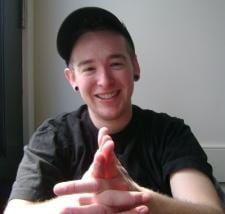For a number of transgender people across the world being seen or heard can cost them their lives. For these men and woman, words like “passing” and “stealth” are as integral to their vocabulary as they are to their daily mindset.
But more and more there are individuals who wake up every morning and ride the fine line between being actively seen as transgender and passing as either man or woman to go about their daily lives. For Winnipegger Rune Breckon, this is most definitely the case. Since Breckon “came out” as transgender in 2004, he has worked tirelessly to spread awareness and wake up the prairie town which filmmaker Guy Maddin argues is always asleep. In an interview with Xtra.ca, Breckon talks about the trials and tribulations that come with his role as the go-to man for the local community and his desire to just pass as a guy.
“I know there was a point in my life where I didn’t know who to turn too,” recounts Breckon about his experience revealing his gender identity. Now working as the full-time volunteer coordinator for the city’s only queer link, the Rainbow Resource Centre (RRC), Breckon recalls the time five years ago when the Centre’s bookshelves and information racks were close to bare of any trans literature. “As soon as I came out as trans, I thought ‘I am not going to be silent about this.’ I wanted to be visible,” says Breckon. “I wanted other people to know that trans people existed and whether it be my voice or someone else’s, I wanted it out there.”
Within weeks Breckon had done exactly that. After spearheading the organization of the city’s first Trans Day of Remembrance (TDOR) service at the University of Winnipeg, Breckon was in demand to speak at number of queer events, including a local Pink Triangle Day service. “I was speaking for 20 minutes in front of 200 people, which was really scary, and I was amazed at the amount of people that came up to me afterwards to say ‘I didn’t know this existed before you spoke; you opened my eyes to an experience that I wouldn’t have otherwise come across.'” Since then Breckon has worked diligently with a tightly-knit group of people to make Winnipeg a better and safer place for trans people to be. In November the collective published the fourth edition of trans.zine!, the city’s first and only trans publication.
When asked how he feels about being referred to as the “token-trans-guy” of Winnipeg, Breckon says “I think some people have definitely placed that label on me, and I don’t mind … but I’m not in it for the shits and giggles of it all — but for the visibility and need for people to be less ignorant.” Though in terms of word choice, Breckon points out that “token” might not be the best because, “as much as we can play on stereotypes there is not one look to being queer and there’s not one to being trans.” However it is safe to say that because of his availability at RRC, Breckon has certainly become a go-to guy of sorts for many people.
Often trans folk from in and outside the city will seek Breckon for answers to their questions. On more than one occasion Breckon says he has received phone calls from people who have friends coming into the city who want to know where it is safe to go. “I enjoy being that person,” he says, “but of course there’s burn out too and naturally I get tired of being the go-to person.”
“It’s so difficult because here I’m saying, ‘I want my experience to be visible, I want trans people to be visible,’ but part of me just wants to pass as a dude.” Breckon admits that he is hurt when people refer to him with the wrong pronoun or make assumptions based on his appearance. “I really take offense to it, and sometimes depending on how I’m feeling, how much sleep I’ve had and how much I had to eat, my heart aches because I wasn’t ‘passable.'” With that said however, Breckon challenges his own self and others facing a similar struggle, and questions what he and others wish to blend into. “I totally understand that ‘just wanting to be ‘normal’ thing, but then I always fire back ‘what is ‘normal’ anyways?’ What are we talking about?”
“I don’t want just male and female experiences,” confides Breckon. “I don’t want that binary in our society. I want a society in which a galaxy of genders is available and we don’t have the stupid checkboxes all the time. So if somebody’s passing really well and wants to be stealth than that’s amazingly great and I get it. But for me personally, I think if we continue to be secretive and continue to be one or the other, female or male… how are we challenging people’s thoughts around gender? And breaking up the foundations of gender expectations and assumptions? By being visible, I think that helps.”
Now having completed his fourth year assisting to organize TDOR, Breckon was overjoyed to see the number of new faces at the service. “There was a lot of trans people that I hadn’t seen before that introduced themselves to me. I had other people grabbing my arm and saying ‘Rune, you need to meet this person!’ And I had people come up to tell me that they were really glad this event is happening, because it gives them the opportunity to just be themselves in a space where they can’t normally be.” Amidst the somberness of last fall’s candlelight vigil, it was clear that for an increasing number of transgender people who are starting to identify themselves as such: being visible can not only take a life, but it can save one too.

 Why you can trust Xtra
Why you can trust Xtra


